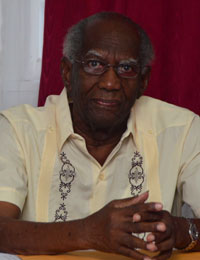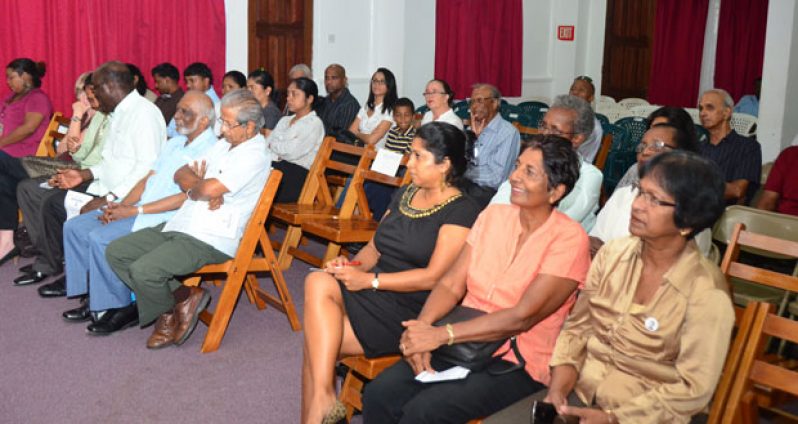HISTORY is important, exhorted Guyana’s highest National Awardee and Senior Counsel Ashton Chase who delivered a special lecture last Wednesday at the Cheddi Jagan Research Centre (Red House), High Street Kingston.

At the occasion which honoured late President Cheddi Jagan 66th anniversary into Parliament, Chase said nowadays people do not pursue history as: “They take the view that event connected to the concerned period have already passed and there is nothing they can do about them”. He explained that in reality, acquaintance with history can point us to the advancement, if any, that has been made or alternatively to the backward step that we have taken, and in general point out the lessons we can learn that may be used or can be used to avoid pitfalls of the past or help us in securing a better future. Considering the theme of the lecture, Chase said in some instances history can give us an opportunity to honour and praise those who have contributed to our advancement.
Chase noted that though the centre is so modern that it used the term ‘Parliament’, there was no Parliament here in the days he dealt with in the lecture. Chase then interpreted the topic as how Dr.Jagan came to be elected to the Legislative Assembly, the vital issues for which he stood and the things he advocated. Put differently this refers to his career from his return to British Guiana in 1943 after completing his studies in the USA, the bodies he helped establish here and those with which he was associated.
Warming to his topic, Chase explained that British Guiana was a colony of Great Britain and today’s parliamentary democracy was not in operation here. “We had what was cited a ‘Court of Policy’ later followed by the Legislative Assembly. “
Membership of this body was limited Chase explained, as apart from nominations thereto by the Government, there were certain property requirements. Generally speaking, for membership in the ‘Court of Policy’ the candidate had to have interalia: Ownership of immoveable property valued not less than $5,000, ownership of not less than 80 acres of land of which not less than 40 acres were under cultivation, ownership and possession under lease for 21 years and upwards of house and land where the annual rental or value of which was not less than $1, 200.
To qualify as a voter in elections to those bodies our countrymen apart from being literate and 21 years of age or over had to have interalia: Occupation or tenancy during the six months previous to registration of house or land of annual rental or value not less than $120.00 secured by lease or document in writing for one year or upwards, Possession or enjoyment of annual income or salary not less than $300 plus residence in the district for six months previous to registration, Payment during 12 months previous to registration of direct taxes to the Colonial Revenue for $20.00 upwards.
The amounts just mentioned have absolutely no relation to today’s values, Chase pointed out, reminding that wage earners in those days were earning less than $1.00 a day and the fact would clearly point to the correct conclusion that the working class was excluded from voting or having seats in the Legislative Assembly.
By the time Dr. Jagan returned to British Guiana in December 1943 from his studies in the USA and was seeking elections in 1947 to the Legislative Assembly those qualifications had been markedly reduced on the recommendation of the West Indies Royal Commission. They were nevertheless still relatively high and excluded much of the working class from participating in those bodies.
The Legislative Council in the 1940s was therefore, apart from the officials and the nominees, a body of planters and their supporters, capitalists and professionals.
Since the bourgeoisie owned the means of production and distribution and at the same time controlled the State Apparatus (the police and the judiciary for example) they used their positions of strength to suppress the working class and to ruthlessly contain and subjugate uprisings from this group.
Quoting Dr.Jagan himself, in an interview with Frank Birbalsingh, Chase said – “The Legislative Assembly was then like a hallowed chamber where gentlemen would sit and debate in leisurely fashion, without concern for the people at the bottom. The function was limited and generally only people from the business and professional class could become elected. So I was, let us say, a maverick in those days”.
Chase said that to put Dr. Jagan’s first Legislative Council contest in proper perspective it should be noted that just over a year before he entered that Legislative contest, Dr. Jagan was a principal founding member of the PAC (Political Affairs Committee). Among other things, this body published a bulletin monthly in which he figured in an exemplary manner. The bulletin exposed what was taking place in the Legislative Council, it supported the struggles of Trade Unions and brought about a tremendous awakening of working class consciousness. So his entry in the 1947 contest was preceded by widespread knowledge of his deep and sincere knowledge and concern for British Guiana’s people and his unsurpassed interest in promoting the welfare and independence of our country.
Before that he was also the Treasurer of the MPCA (Man Power Citizens Association) in 1945, a post from which he resigned in the following year as he was unable to get the leadership of that trade union to vigorously and purposely fight for the rights of the workers.
The first of the above contests that he entered was to be representative for Central Demerara District in 1947. This constituency included Buxton and the sugar estate plantations on the Lower East Coast of Demerara. His contestants were Mr. John D’Aguiar, a Capitalist who previously held a seat in the Legislative and Executive Councils, Mr. H.L Palmer, of advanced age but with a reputation in the field of Local Government, and backed by the L.C.P (League of Coloured Peoples) and Mr. Frank Jacob, a lawyer from the Labour Party. Jagan defeated them all, having a close margin over D’Aguiar.
He had the full support of those sugar workers who were enfranchised for this elected. As stated above, this was due to the recommendations of the West Indies Royal Commission popularly called the Moyne Commission which came here and in the West Indies in the 1940s to investigate the disturbances of the 1930s. Qualifications for voters were reduced to earning $10 per month and for candidates $100 per month.
In his campaign Dr. Jagan had the full support of Mr. Sidney King (now Eusi Kwayana), a teacher of Buxton. He spoke at several of his public meetings. Our heroes manifesto advocated Constitutional change and vital improvements in the field of Agriculture, Education, Medical services and Labour legislation. In respect of the latter it canvassed a 40 hour week without reduction in pay, Minimum wage legislation, two weeks annual holiday with pay, time and a half for overtime, Sundays and Public Holidays being double pay and equal pay for equal work.
Dr. Jagan shortly after the elections joined the Labour Party, but this was a party without ideological grounding. Only three of its candidates were elected at the 1947 elections, but they never operated as a team. In less than two years after the elections, the Labour Party (of which Chase was Assistant Secretary disintegrated.
According to Chase, the workers found an outstanding champion of their rights in Dr. Jagan. The solemnity of the Legislative Council was rudely shaken by his vigorous advocacy of the cause of the workers. He had a passion for statistics. He used these in his pungent and forceful arguments to expose reaction and to lay before the workers, the vicious system that exploited them. At sitting after sitting, he assaulted the vaunted privileges of capitalists. On many occasions singlehandedly, but nevertheless most heroically and inspiringly he fought for the workers’ rights. He had laid down for the elections four criteria that candidates should possess, they were: Full awareness of working class and problems, thorough knowledge of the theory and practice of comparative governments with special emphasis on labour legislation.
As the lecture winded down Chase, informed his captive audience that Dr. Jagan took his seat in the Legislative Council on December 18, 1947 at age 29. He was the youngest member of the Legislative Council. He made several motions that were defeated, these included a National Minimum Wage, two weeks Annual Vacation Leave with pay, time and a half for ordinary overtime, double Pay for working on Sundays and Holidays and Public Holidays and equal pay for equal work.
Chase reiterated that Dr. Jagan advocated the rights of rice planters in the Legislative Council. He stood firmly on the side of the poor and disadvantaged. Drainage and Irrigation, Pure Water Supply, Dilapidated ranges on the sugar estates and education for the masses engaged his attention.
The Jagans participation in the budget debates secured wide public attention for his struggles on behalf of the working class. In 1948 the Colonial Treasurer proposed an export tax for 30 cts per ton in place of the 1 ½% tax on the value of bauxite exported from British Guiana. To him this was far from satisfactory and showed how we were being exploited by the Demerara Bauxite Company. The links between Alcoa and Alcan were made public and he showed how Canada were making huge gains through the Company’s extraction of bauxite.
Budget presentations gave him golden opportunities to point to and condemn the exploitation by the sugar producers of our country. He magnificently demonstrated the wide division of gaps between the rich and poor in this colonial outpost. Their authority was so great that after the 1948 killings at Enmore and even though he was elected to represent lower East Coast Demerara, he was banned from the sugar producers from visiting the estates.
The Colonial power maintained their supremacy in the interior mainly through the operations of the Rupununi Development Company, a cattle company dominated by the Sugar Producers. Jagan was the first non-Amerindian that voiced protests and opposed the degradation.
In 1951/52 there was the dumping of large quantities of milk by the government. There were protests spearheaded by Federation of Unions of Government Employees (FUGE). The only legislator who spoke was Jagan.
Another important matter he had to deal with in the Legislature was what was publicly portrayed as “subversive literature”, which publications were made in the United Kingdom touching socialism and communism.
As Chase noted, this period (1943-1953) provided vital information from which we can learn and benefit from what transpired.
Chase is the lone survivor of the Political Affairs Committee (PAC), the precursor to the People Progressive Party (PPP), as well as the only founder-member of the PPP which was formed in January 1950.
(By Michelle Gonsalves)



.jpg)









